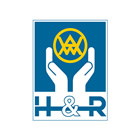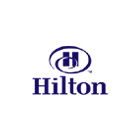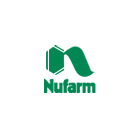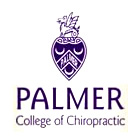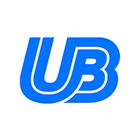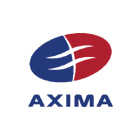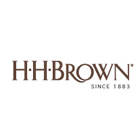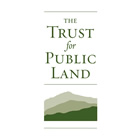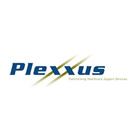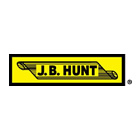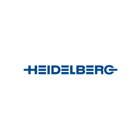
Backup Multiple Drives using SyncBack
Author: Swapna Naraharisetty, 2BrightSparks Pte. Ltd.
Many people have multiple storage drives on their computer, for example, an SSD for operating system files, a hard disk for work files, and an external drive for personal files. Therefore, it is important for all computer users and businesses to backup data on multiple drives frequently to safeguard against data loss. However, backing up drives one by one will can be a tedious and time-consuming process. Thus, SyncBack provides a simple and convenient way to backup multiple drives at once.
In this article, we will discuss the different methods of backing up multiple drives on a computer to an external drive using SyncBack:
- AllDrives Script (SyncBackPro only)
- SyncBack Touch (not available in SyncBackFree)
- All Volumes Path (introduced in SyncBack V11)
AllDrives Script (SyncBackPro only)
Using the advanced scripting feature in SyncBackPro, you can backup several drives using a single backup profile. The AllDrives script is a location script that gives access to all the drives on a computer. Therefore, you can create a backup profile and use the AllDrives script as the profile’s source to backup multiple drives on your computer.
Backup Multiple Drives Using the AllDrives Script
For this example, we will create a backup profile and use the AllDrives script to backup multiple drives to an external drive.
1. Install the AllDrives script before using it. Select Scripts from the burger menu  (top-left of the SyncBackPro main window). Click the Install button and select the AllDrives script from the SyncBackPro installation folder. Then click the OK button to close the window.
(top-left of the SyncBackPro main window). Click the Install button and select the AllDrives script from the SyncBackPro installation folder. Then click the OK button to close the window.

2. Click on the New button to create a new backup profile. On the third screen of the wizard (where you select the source and destination), change the source to All Drives Location (from the drop-down menu) and click on the Done button.
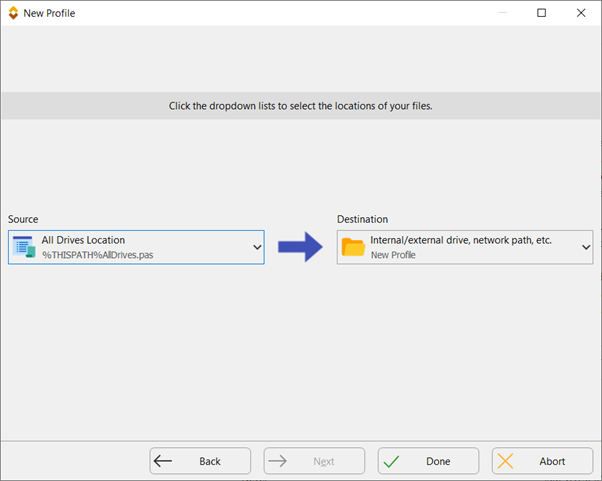
3. On the Profile Setup window, enter \ (backslash) in the Source path (script) and set the Destination path to a folder on the external drive (where you want to backup your files), e.g. G:\Backups\
4. To backup only important files (e.g. files created by you) from each drive, click Choose sub-directories and files button, untick the root to deselect everything below it, and then select the files/folders to backup from each drive.
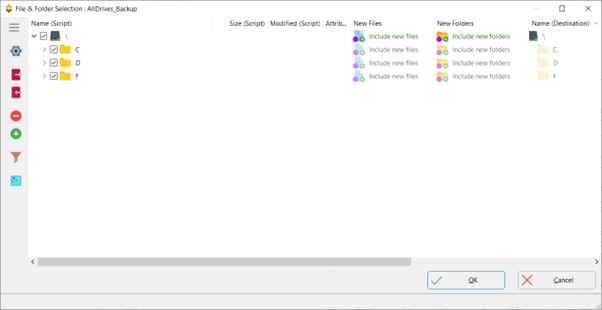
5. Once you have made your selections, click the OK button to close the File and Folder Selection window and save the settings.
6. You can run the profile manually or schedule it to run automatically to backup selected drives to an external drive.
SyncBack Touch (not available in SyncBackFree)
SyncBackPro and SyncBackSE can access multiple disks (or volumes) on your Windows or Mac computer through SyncBack Touch. So, you can use a single SyncBack Touch profile to backup several drives on your computer.
Backup Multiple Drives Using SyncBack Touch
For this example, we will create a backup profile and use SyncBack Touch as the profile’s source to backup all drives on a Windows computer to an external drive.
1. Install SyncBack Touch on the Windows computer you want to backup, and make sure it is running. Then install SyncBackPro or SyncBackSE on the same or a different Windows computer.
2. Run SyncBackPro or SyncBackSE and click on the New button to create a new backup profile. On the third screen of the wizard (where you select the source and destination), change the source to SyncBack Touch and then click Next.
3. On the SyncBack Touch connection details page, click the magnifying glass button and select the appropriate device from the drop-down list. If the device cannot be found, or you are accessing it via the Internet, you can manually enter the hostname or I.P. address of the device and untick the option Find and connect to the SyncBack Touch device using its name.
4. If SyncBack Touch is configured to verify usernames and passwords with an SBMS server, or Touch is installed with user impersonation, then enter the username and password. By default, no username and password are required by SyncBack Touch. Next, click the Test button to test the connection with SyncBack Touch.
5. If the connection is successful, click the Done button. If you have problems, refer to our Configuring SyncBack Touch to backup files over the Internet article. The help file also includes a section on connection problems.
6. In the Profile Setup window, configure the destination path to a folder on the external drive (where you want to backup your files).
7. To backup only important files (e.g. files created by you) from each drive, click the Choose sub-directories and files button, untick the root to deselect everything below it, and then select the files/folders to backup from each drive. Save the settings. Finally, run the profile manually or schedule it to run automatically.
Note: SyncBack Touch is free with SyncBackPro V10 or SyncBackSE V10 (or newer versions).
All Volumes Path (introduced in SyncBack V11)
When SyncBack V11 was released in July 2023, it introduced the special All Volumes Path \\?\. If you use this path as your source (it can also be a destination) then you can access all the volumes on your computer, including those that do not have a drive letter assigned to them. It's very simple to use:
- Create a new backup profile. The destination (where you are copying the files to) can be wherever you wish, e.g. the cloud.
- Set the Source to \\?\
- Click the Choose sub-directories and files button. You'll see all the volumes on your system.
- Choose the volumes, folders and files you want to copy.
The help file has more details. The All Volumes Path is available in SyncBackFree, SyncBackSE and SyncBackPro.
Important Points to Note
- When backing multiple drives, you should ensure that the storage capacity of the backup drive is larger than the total amount of data you are backing up.
- SyncBack supports backing up files and folders that are created by you (or that you have access to) on your computer. Therefore, you should identify the important files to backup (for example, user’s documents, videos and pictures) and include them in your profile selections under Modify > Simple > Choose sub-directories and files settings page.
Conclusion
In this article, you learned how to use SyncBack Touch and the AllDrives script to backup multiple drives at once. With these options, you can backup the data on all your computer's drives and protect yourself from data loss.
Noted Customers
© 2003-2025 2BrightSparks Pte. Ltd. | Home | Support | Privacy | Terms | Affiliate Program

